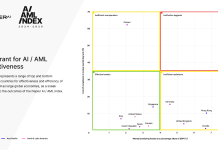In the evolving financial landscape, institutions are increasingly harnessing cloud technology to bolster their financial crime compliance strategies.
According to SymphonyAI, this transformation is driven by the need for agility and efficiency amidst growing regulatory demands and the rapid pace of technological advancements. Here’s why moving financial crime compliance to the cloud is not just a necessity but a strategic advantage for banks and other financial entities.
Financial crime is a persistent threat that evolves as quickly as the measures put in place to combat it. The traditional systems, while robust, often lack the flexibility to adapt to rapid changes in regulatory requirements which include frequent updates to government watchlists and sanctions.
Cloud-based AI Software as a Service (SaaS) platforms like the Sensa Investigation Hub are proving indispensable. These platforms offer the scalability and adaptability needed to manage risks effectively without compromising compliance standards.
One of the most significant advantages of cloud technology is its scalability. Financial institutions experience varying levels of demand on their systems, especially during periods of high transaction volumes. Cloud technology allows for an elastic service model that can expand or contract based on the institution’s needs, ensuring that they are not left over-equipped during quieter periods.
This flexibility extends to workforce management as well, supporting remote and hybrid working models that have become the norm.
Cost management is crucial in non-revenue generating areas such as compliance. Cloud solutions provide an opportunity to reduce expenses associated with traditional compliance processes. By automating and streamlining KYC checks and other compliance measures, institutions can maintain an effective compliance stance while managing costs.
This not only reduces the need for extensive physical infrastructure but also shifts the focus for compliance teams helping to automate low level, manual tasks so expert resource can be spend on the critical work of investigation. Instead of ever-increasing resource demands, existing resource is use more effective and efficiently, thereby managing overheads.
Data security is a paramount concern, with breaches often occurring not due to the cloud’s failings but because of internal security lapses. Cloud providers such as AWS, Azure, and Google Cloud offer robust security measures that are frequently updated to respond to emerging threats more swiftly than traditional on-premises solutions.
This level of security assurance is vital in building trust and maintaining the integrity of financial institutions’ compliance processes.
The complexity of managing data across multiple systems can hinder effective compliance. Cloud technology simplifies these challenges by unifying data management processes. It enhances data accessibility and governance, thereby improving the quality of financial crime detection and the overall compliance posture of institutions.
Keep up with all the latest FinTech news here.
Copyright © 2024 FinTech Global











